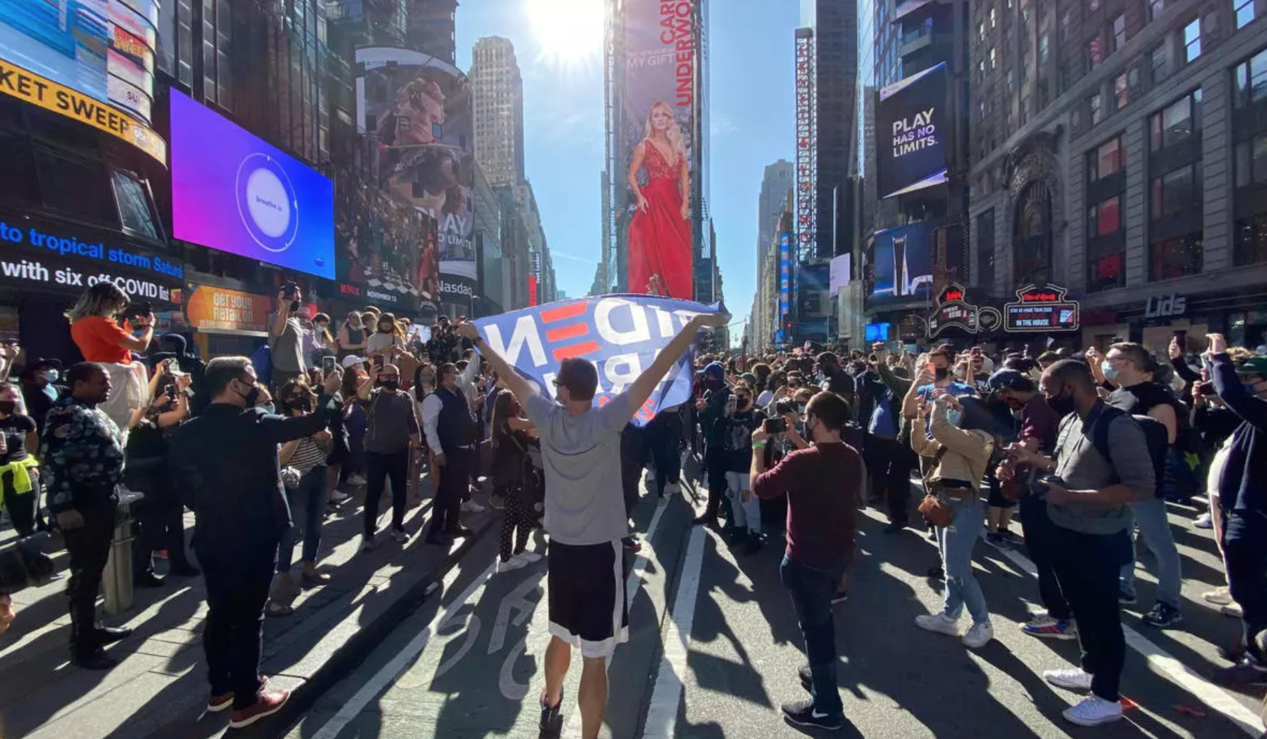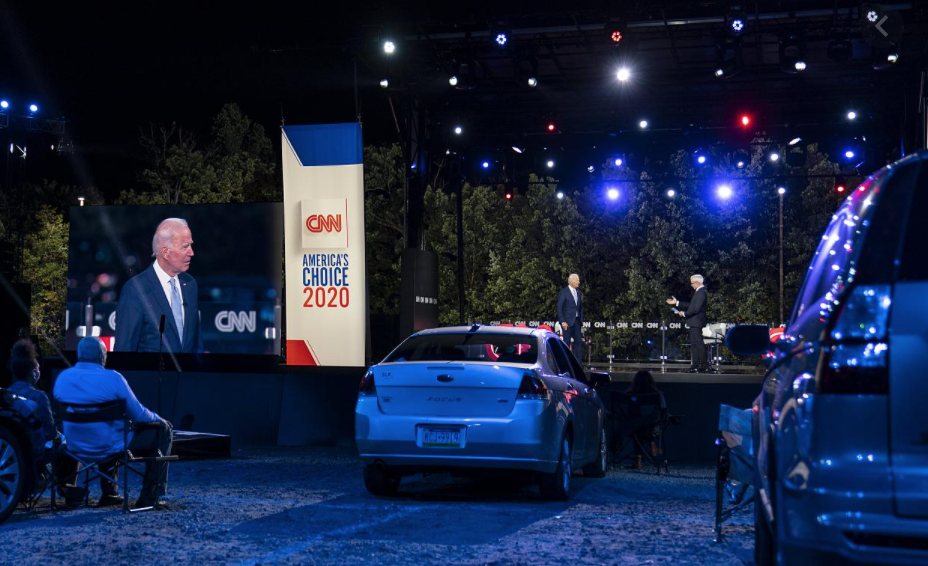What Does The Triumph of Biden-Harris Represent Historically?
As spontaneous outbursts of joy and jubilation broke out across the country Saturday morning at the announcement that Joe Biden and Kamala Harris had defeated Donald Trump, I was reminded of another period when democracy returned from exile. Church bells were ringing in Paris, as though a war had just ended. And in many ways, those church bells were right: this election America found itself in a low-grade but existential civil war which would determine the fate and character of the country. Would we have four more years of racism, xenophobia, misogyny, white nationalism, and anti-Semitism emanating from the White House? Or might we return to a different vision of what America could be? But there is a flaw to this interpretation.
“This is not who we are,” Biden, Harris, and many others insisted during the campaign. Yet we must acknowledge the fact that 70,000,000 Americans voted for Trump. The candidate and President understood his supporters all too well. “I could stand in the middle of Fifth Avenue and shoot some people and I wouldn’t lose voters.” We can only conclude that this is indeed – partially – who we are. Americans must again grapple with the fact that millions of our fellow citizens have no problem renouncing liberty and morality in turn for a regime that promises “law and order” (which really means the suppression of minorities as they become a majority) along with a rising stock market. In 1939, Carlo Levi had examined this phenomenon of renouncing the burden of freedom in his book Paura della libertà.
What was different this time was that Trump said aloud what had previously been thought in private or said only in whispers among like-minded reactionaries. “You know what I am?” Trump asked rhetorically at a rally in October 2018. “I’m a nationalist!” His defenders claim Trump is not a racist. Yet the support of the Proud Boys, the Aryan Nation, the Ku Klux Klan, white nationalist and militia groups all support him because they think he’s a racist. It’s quite simple really: if racists embrace you as a racist, you are most certainly a racist.
Americans should not make the same mistake committed in Italy after World War II in thinking that fascism was merely a “parenthesis” in Italian history. The most eminent Italian philosopher of the time, Benedetto Croce, transplanted from Abruzzo to Naples, argued that the Ventennio was merely a parenthesis in the unfolding of liberty in History. Mussolini and his regime were a “temporary” (20 years!) detour or deviation on the road of History.
Croce later amended his theory and argued that fascism was a “moral sickness,” a virus that had infected the Italian body politic. The war, continuing the metaphor, could be seen as the “fever” that broke the infection and supposedly restored Italy to “health.” When historian Gaetano Salvemini returned to his chair at the Università di Firenze in 1949, he began his first lecture with a wry reference to his more than 25 years in exile: “As we were saying in the last lecture . . .” But Salvemini feared a return to a pre-fascist past. It was Piero Gobetti, the brilliant young intellectual from Torino who better understood and offered a more biting critique: “Fascism has in some sense been the autobiography of a nation,” Gobetti wrote in 1922, merely a month after Mussolini came to power. It was embraced by “a nation that rejects the political contest, that worships unanimity, and shrinks from heresy.” We cannot think of Trumpism as a parenthesis in American history, an aberration, or a fevered infection that has now passed out of our body politic. Trumpism is a chronic condition that with the right circumstances, will return. It is a latent virus, ready to destroy us when the immune system is weakened. 70,000,000 voters cannot be dismissed so easily with wishful thinking. Trumpism represents deep and still vital forces in the collective psyche of America.
Even before Trump took office, a debate raged in America, Italy, and elsewhere as to the relationship between Trumpism and fascism. The early signs were ominous. The day after Trump’s inauguration, press secretary Sean Spicer insisted that the crowd was the largest in American history, when it most obviously was not. As the public grappled with “alternative facts” and gaslighting, less attention was given to Spicer’s chilling declaration: “We’re going to hold the press accountable.” In a democracy, the press holds the government accountable; it’s only in dictatorships that the government holds the press accountable. The press and most people were so consumed with the ridiculous spectacle of arguing about crowd size that they missed this far more dangerous claim.
“Every age has its own fascism,” wrote Holocaust survivor Primo Levi in 1974. And Trump has been “our” fascism. “We see the warning signs,” Levi warned, “wherever the concentration of power denies citizens the possibility and the means of expressing and acting on their own free will. There are many ways of reaching this point, and not just through the terror of police intimidation, but by denying and distorting information, by undermining systems of justice, by paralyzing the education system, and by spreading in a myriad subtle ways nostalgia for a world where order reigned, and where the security of a privileged few depends on the forced labor and the forced silence of the many.”
Ogni tempo ha il suo fascismo: se ne notano i segni premonitori dovunque la concentrazione di potere nega al cittadino la possibilità e la capacità di esprimersi ed attuare la sua volontà. A questo si arriva in molti modi, non necessariamente col terrore dell’intimidazione poliziesca, ma anche negando o distorcendo l’informazione, inquinando la giustizia, paralizzando la scuola, diffondendo in molti modi sottili la nostalgia per un mondo in cui regnava sovrano l’ordine, ed in cui la sicurezza dei pochi privilegiati riposava sul lavoro forzato e sul silenzio dei molti.
The work of scholars such as Ruth Ben-Ghiat, Federico Finchelstein, and Jason Stanley, clearly demonstrate the relationship between authoritarianism, populism, fascism and Trump. We had already been warned by Sinclair Lewis in 1935 It Can’t Happen Here and Philip Roth The Plot Against America (2004). The Italian writer Ignazio Silone had foreseen the Trump phenomenon in 1937 with La scuola dei dittatori in which an American millionaire travels to Europe to study fascism first-hand for a coup in America. Beneath the sunny disposition of Uncle Sam, Fourth of July parades and Norman Rockwell paintings lies a fervent and fetid stream of racism and hatred that has shaped our country since its inception.
So what does the triumph of Biden-Harris represent for us historically? It’s been a standard line of interpretation that Biden represents a desire to “return to normal.” The reasoning in electing him the Democratic nominee was that America was exhausted by Trump – by his corruption, by his incompetence, by his racism – and that most Americans simply want a country where we aren’t obsessively checking our phones to see the latest political or moral outrage perpetrated by the Trump administration. A country where we are not sickened and ashamed of our president and the criminals he has placed in positions of power to dismantle the very organs of government they are supposed to lead. But, just as a return to a pre-fascist past in Italy had to be resisted, so too a Biden presidency cannot return to a pre-Trump politics.
The problem is that the Republicans in Congress will surely refuse to work and collaborate with the new administration in solving the nation’s many problems. Just as Mitch McConnell obstructed much of President Obama’s agenda starting in 2010 with the collaboration of the Tea Party caucus, the Senator from Kentucky will do the same with Biden in the hope that conditions will be so bad that a new Republican president will return to the White House in 2024. It would take a political miracle for the two run-off races in Georgia to give the Democrats a majority in the Senate. Precisely for that reason, Biden, Harris, and Obama should join the indefatigable Stacey Abrams in Georgia and continue campaigning.
In postwar Italy, the Italians and the political class failed to rise to the occasion. The “vento dal Nord,” the ideals of the anti-fascist and anti-Nazi Resistance, was snuffed out by the Christian Democrats with assistance from the British, the Americans, the CIA and the Catholic Church. (“Communist eat babies!” priests shrieked hysterically from Italian churches before the 1948 election, echoed today by the bizarre QAnon conspiracy theory that Washington, D.C. is controlled by a “deep state” of pedophile Democrats who eat babies.)
But there is reason for hope. It can’t be emphasized enough how important the selection of Kamala Harris as vice president will be in the coming struggle. The daughter of immigrants from India and Jamaica, the first female and Black vice president, Harris represents what America can be: more than just “tolerant” but accepting of difference and change. She is a symbol that Italian Americans can and should embrace if we remember Geraldine Ferraro. A record number of people voted in this election, yet fully one third did not. Harris, along with the composition of a Biden Cabinet, should demonstrate that we now have and want representation of all Americans in the halls of power.
In the course of the campaign for the Democratic nomination and the general election, Biden had already signaled he is conscious of the singular moment in history. In recalling the ideals of Franklin Roosevelt and casting himself as having goals just as large in reshaping American society, he has to judiciously balance a desperate desire to return to normal with a bold political agenda on climate change, infrastructure, education, and social justice. Only in radically remaking the lives of millions of Americans will the poison of Trumpism be buried once and for all.
It would be a political and moral tragedy if America, finding itself at a crossroads, takes the wrong path.
-----
Stanislao Pugliese
Professor of History and Queensboro Unico Distinguished Professor of Italian and Italian American Studies
Hofstra University








































Comments
1
1
1
1
1
1